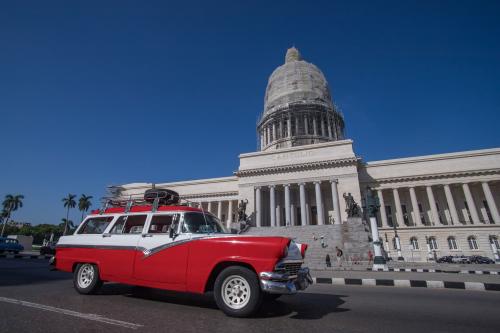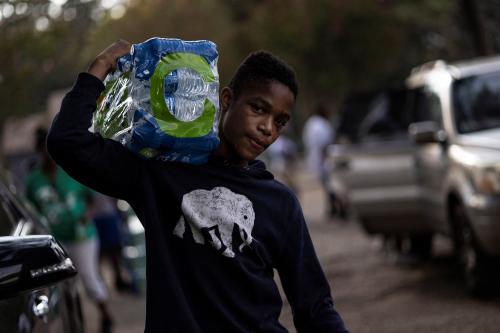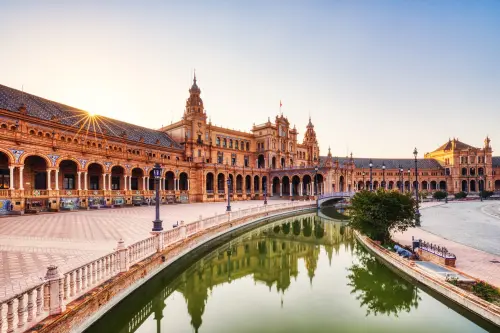On April 2, 2011, Ethiopia embarked upon the construction of what is expected to be the biggest hydroelectric power plant in Africa. Called the Grand Ethiopian Renaissance Dam (GERD), it will be located on the Blue Nile, 40 kilometers (25 miles) from the border with the Republic of Sudan and will have the capacity to produce 6,000 megawatts of electricity. The GERD, once completed and made operational, is expected to ameliorate chronic domestic energy shortages, help the country’s households (especially those located in the rural areas) switch to cleaner forms of energy and allow the government to earn foreign exchange through the exportation of electricity to other countries in the region. Although authorities in Addis Ababa believe that the dam will contribute significantly to economic growth and development—not just in Ethiopia, but also in neighboring countries, such as Sudan—its construction has been very controversial. The major controversies revolve around Ethiopia’s decision to fund the building of the dam from its own sources and the potential impacts of the dam on downstream countries, especially Egypt.
Ethiopia opted to source funds for the construction of the GERD through selling bonds to citizens at home and abroad. Government employees have been encouraged to devote as much as one or two months of their salaries to the purchasing of the GERD bonds. Most public workers in Ethiopia earn relatively low wages and face a significantly high cost of living. Hence, they are not likely to be able to sacrifice that much of their salaries to invest in this national project. Nevertheless, many of them have been observed purchasing the GERD bonds, primarily because of pressure from the government and the belief that participation in this national project is a show of one’s patriotism.
The government of Ethiopia has also encouraged the private sector to invest in the GERD project. Specifically, private domestic banks and other business enterprises are expected to purchase millions of Birr worth of these bonds. The government also hopes that Ethiopians in the diaspora will contribute significantly to this massive effort to develop the country’s hydroelectric power resources. However, many Ethiopians in the diaspora have not been willing to invest in the GERD project, citing pervasive corruption in the public sector and dictatorial government policies as reasons why they would not commit the resources necessary to move the project forward. Additionally, Ethiopians living outside the country have argued that the present government in Addis Ababa continues to impede the country’s transition to democracy by making it virtually impossible for opposition parties to operate, using draconian laws (e.g., anti-terrorism laws) to silence legitimate protests and generally denying citizens the right to express themselves. For these reasons, many of them have refused to invest in the GERD project. Finally, Ethiopia’s traditional development partners, including such international organizations as the World Bank and the International Monetary Fund, appear to be unwilling to lend the country the necessary funds for the construction of the dam given the controversies surrounding the dam and their policies on the building of megadams.
Egypt has registered its opposition to the construction of the GERD. In fact, before he was ousted, former Egyptian president Mohamed Morsi made it known to authorities in Addis Ababa that Egypt would not support the project. The Egyptians, as they have done before, have invoked the Anglo-Egyptian Treaty of 1929, which granted Egypt veto power over all construction projects on the Nile River and its tributaries. According to Cairo, then, Ethiopia was supposed to obtain permission from Egypt before embarking on the GERD project.
In May 2010, five upstream riparian states (Ethiopia, Kenya, Uganda, Rwanda and Tanzania) signed the Nile Basin Cooperative Framework Agreement (CFA), which, they argue, would provide the mechanism for the equitable and fair use of Nile River waters. On June 13, 2013, the Ethiopian Parliament ratified the CFA and incorporated it into domestic law. The other four signatories have not yet ratified the treaty but plan to do so eventually. Egypt and Sudan, however, have refused to sign the CFA and continue to argue that the 1929 Anglo-Egyptian Treaty, as well as the 1959 bilateral agreement between Egypt and Sudan, represent the only legal mechanisms for Nile River governance. Recently, however, the government of Sudan has indicated its support for the GERD, and South Sudan, which gained its independence from Khartoum on July 9, 2011, does not oppose the project either.
Significant increases in population in Egypt, the need for the country to expand its irrigated agricultural base, as well as other industrial needs have significantly increased the country’s demand for water. Unfortunately for Egyptians, the only viable source of water in the country is the Nile River. Thus, Egyptians, as made clear by their leaders, are not willing to relinquish even one drop of water. The country’s bitter opposition to the GERD stems from the fact that it will reduce the flow of water into the Nile River and force Egyptians to live with less water than now. Egyptian leaders are not willing to accept the assertion made by the Ethiopian government that the construction of the dam will not significantly reduce the flow of water from the Blue Nile into Egypt. Thus, Cairo has hinted that it would employ all means available to stop the construction of the GERD.
The site of the GERD was identified during geological surveys conducted between 1956 and 1964 by the United States Bureau of Reclamation. Although studies determining the feasibility of a dam on the Blue Nile were completed almost half a century ago, previous Ethiopian governments did not make any attempt to build such a structure on the Blue Nile. This inaction may have been due to Egypt’s ability to lobby the international donor community and prevent it from providing Addis Ababa with the necessary financial resources to complete the project, Ethiopia’s chronic internal political instability, or Egypt’s military strength and its strong ties with neighboring Sudan (the latter shares the same interests as Egypt regarding the waters of the Nile River). In fact, the 1929 Anglo-Egyptian Treaty and the 1959 bilateral agreement between Sudan and Egypt granted both countries complete control of all the waters of the Nile River.
Since the ouster of Hosni Mubarak, Egypt has been weakened significantly, politically, economically and militarily. The struggle between the military and civil society for control of the government has been a major distraction to the Egyptian military, and it is unlikely that it can effectively face a relatively strong and more assertive Ethiopian military. Hence, it appears that this might be the most opportune time for Ethiopia to initiate such a construction project. Perhaps more important is the fact that virtually all of the upstream riparian states are no longer willing to allow both Egypt and Sudan to continue to monopolize the waters of the Nile River. In addition, Ethiopia is relatively at peace and maintains good relations with its neighbors, particularly the Republic of Sudan, which would be critical in any successful attack on Ethiopia by Egypt. Of course, Addis Ababa has also invoked and relied on the Cooperative Framework Agreement which, besides Ethiopia, has been signed by four other upstream riparian States—the CFA favors the equitable and fair use of the waters of the Nile River. Authorities in Addis Ababa believe that the GERD will contribute to such fair and equitable use; after all, the Blue Nile (which is located in Ethiopia) provides 86 percent of the water that flows into the Nile River. Up to this point, Ethiopia has made virtually no use of that water, allowing Egypt and Sudan alone to dictate its usage.
Critics of the GERD, including some Ethiopians within and outside the country, argue that Addis Ababa initiated the building of the dam just to divert public attention away from internal political tensions associated with lack of religious freedom, human rights violations, suppression of the press, and the economic and political polarization that has become pervasive throughout the country during the last several decades.
Given the economic significance of the Blue Nile for the source country (Ethiopia) and downstream countries (Egypt and Sudan), it is critical that these countries engage in constructive dialogue to find a mutually beneficial solution for the project. Such negotiations should take into consideration the fact that the status quo, characterized by Egyptian monopolization of the waters of the Nile River and the exclusion of Ethiopia from exploiting its own water resources for its development, cannot be maintained. Thus, the construction of the GERD should be taken as a given and the three countries—Egypt, Sudan and Ethiopia—should find ways to maximize the benefits of the dam and minimize its negative impacts on the downstream countries. As part of that negotiation, both Egypt and Sudan should abandon their opposition to the CFA, sign it and encourage their legislatures to ratify it. The Nile River and its tributaries should be considered common property belonging to all Nile River Basin communities and should be managed from that perspective.
The Brookings Institution is committed to quality, independence, and impact.
We are supported by a diverse array of funders. In line with our values and policies, each Brookings publication represents the sole views of its author(s).



Commentary
While Egypt Struggles, Ethiopia Builds over the Blue Nile: Controversies and the Way Forward
July 25, 2013